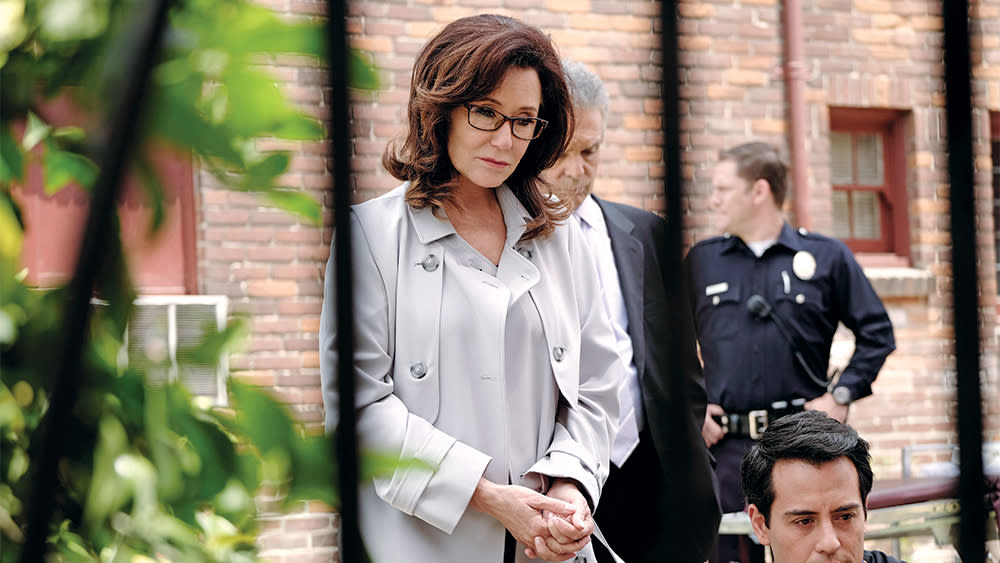‘Major Crimes’: Why Was the Star Killed Off a Hit Show? (Column)

The saga of the final season of “Major Crimes” has had more twists than many a crime procedural — but the most perplexing ones didn’t necessarily occur onscreen.
Mary McDonnell’s character, Sharon Raydor, died on the show — several episodes before the series finale, which aired on Jan. 9. Even more unsettling was the fact that, in the final three episodes, the actress’ name was removed from the credits of the show she’d been the star of for six seasons.
Yes, actor’s names often do get taken out of a show’s opening credits when that character has been killed off (or when producers want the audience to think that the character’s dead). But it’s rare for that to happen to the undisputed lead of a show — and certainly as the show is reaching its conclusion.
The move drew outrage on social media from the show’s fans, who noticed immediately. McDonnell declined to comment for this column, as did TNT and Warner Bros. TV, the studio that makes “Major Crimes.” A studio spokesperson did point out, though, that the removal of an actor’s name from episodes in which that performer did not appear was common practice at both “The Closer” and “Major Crimes” over the last 13 years, and conforms to contractual and guild requirements.
But the death of Sharon Raydor before the series finale also simply felt jarring, and it’s hard not to view it as a storytelling misfire. As a casual viewer of “Major Crimes,” that narrative decision never sat right with me. Given that Raydor’s professional life revolved around solving crimes, why take the conclusion of the show’s final case away from her? Why take away her agency, just when the critical denouement was playing out?
In an interview with Variety published last month, McDonnell addressed Raydor’s death and talked about her reaction when creator James Duff proposed it. “I understood what he was talking about as an artist,” McDonnell told Variety in December. “For himself and for the fans, he wanted to have some control over how the show ended and what kind of story he brought to his final season.”
Here’s why this should matter, even to those who don’t watch “Major Crimes”: We need to continue to have complex female characters at the center of on-screen stories. And every one that we lose hurts.
In this TV landscape, it’s still unfortunately uncommon to see a woman as the lead character of a mainstream one-hour drama. There’s a welcome increase in the appetite for that kind of programming all over the TV industry. And yet “Major Crimes” is done, despite still having performed well in the ratings in its final seasons; despite having a vocal and committed fan base.
“Major Crimes” may not have been the trendiest or edgiest show on the air, but it had a lead character of unusual moral fortitude and courage. The drama also demonstrated solid storytelling skills — and many members of its ensemble had been together for the 13-year combined run of both “The Closer” and its spin-off, “Major Crimes.” For a smoothly operating entity with a long track record of success, the ending of this 13-year franchise felt both abrupt and discordant.
Despite the various explanations offered for Raydor’s untimely exit, it still doesn’t make much sense to me. I can understand wanting to wrap up the show’s narrative in a definitive way, but asking fans to watch the final arc of the show play out without its core character didn’t feel like the best way to pay tribute to the show’s group dynamics, or to the head of that team. Raydor’s skillful leadership was important — until she was just gone.
All things considered, it’s a twist that the powers that be should have left on the cutting room floor.
Related stories
Turner Promotes Marketing Chief Michael Engleman, Communications Exec Marie Moore
'Snowpiercer' Series Starring Jennifer Connelly Greenlit at TNT
Our Staff Picks: TV Shows to Watch the Week of Jan. 8, 2018
Subscribe to Variety Newsletters and Email Alerts!

